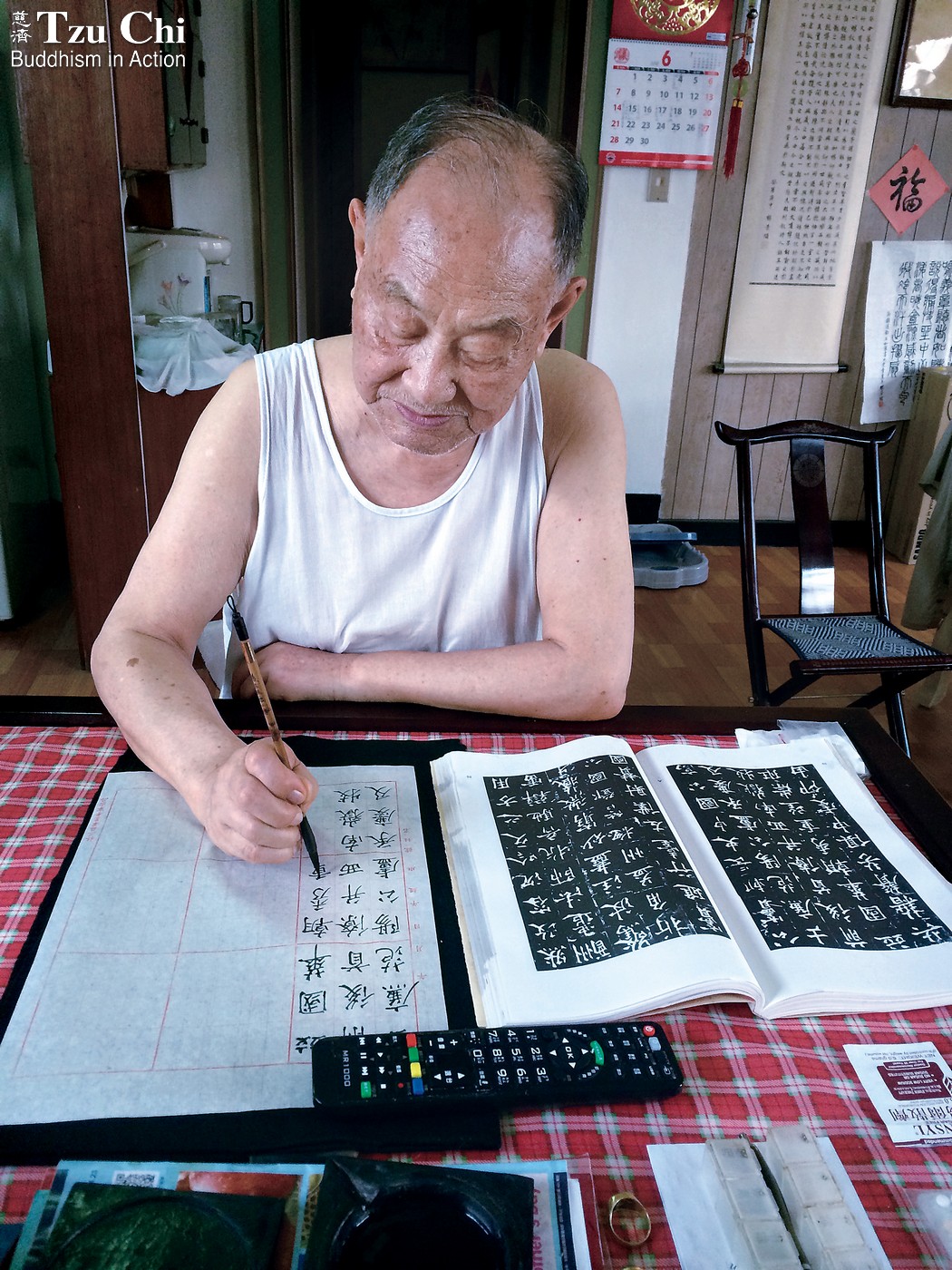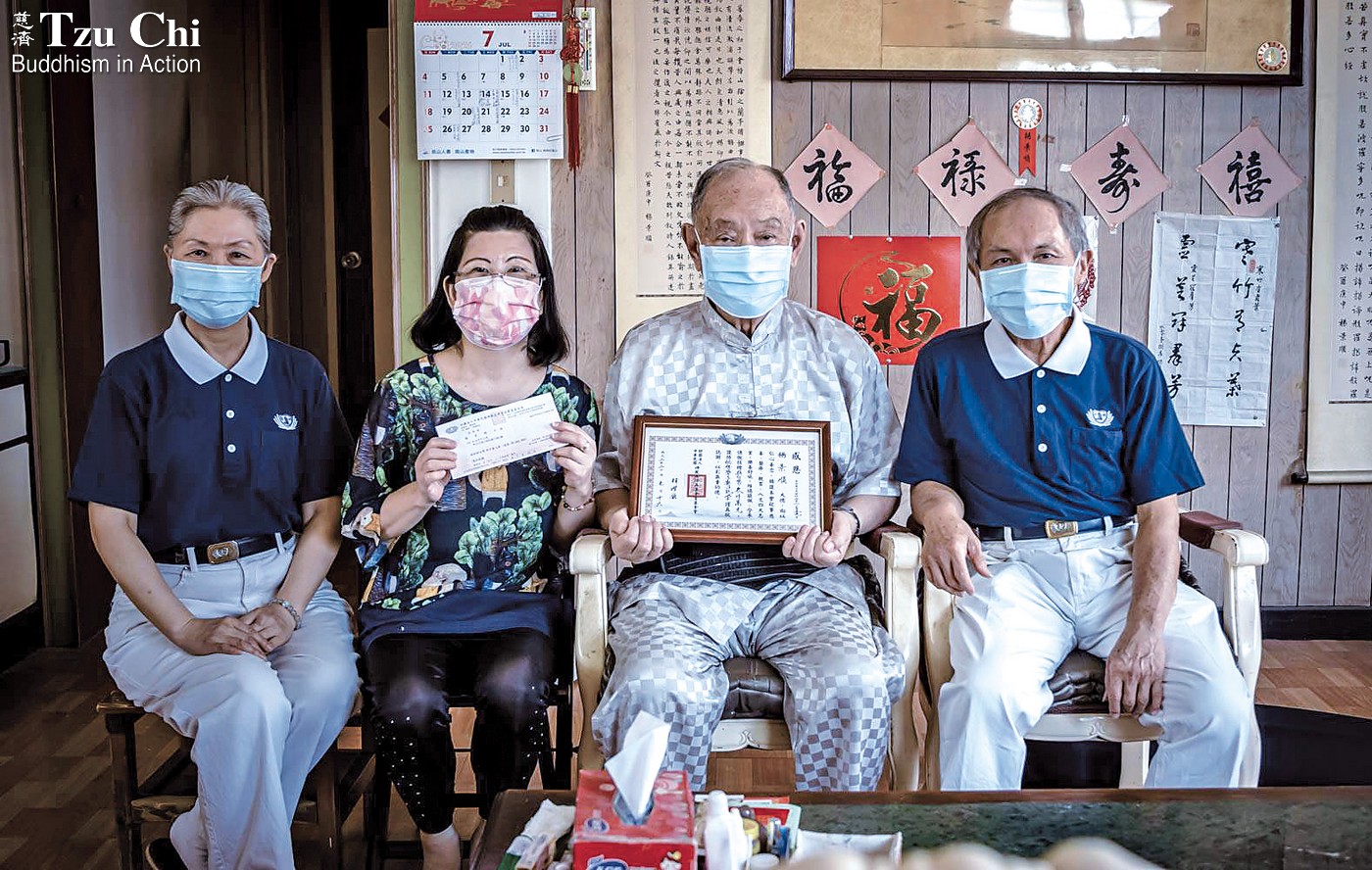By Hong Jing-jing
Translated by Wu Hsiao-ting
Yang Jing-shun, fleeing the Chinese Civil War as a student, endured an arduous journey of over a thousand kilometers. Knowing what it is like to be displaced, he reached out when he had the means to support underprivileged children in the pursuit of their education.
Yang Jing-shun, 96, taught himself calligraphy to compensate for the regret of being unable to complete his education due to the turmoil of war.
Courtesy of Yang Jing-shun

Inside a weathered house that has stood for more than 60 years, Yang Jing-shun (楊景順), 96, sits serenely at a square table in the living room. Unperturbed by the cacophony of car noises outside, he holds an ink brush, diligently transcribing a chapter from the Book of Rites, one of the Five Classics of the Confucian canon.
Yang’s life journey mirrors a captivating and turbulent historical biography. In 1949, amidst the relentless gunfire and upheaval of the Chinese Civil War, he managed to survive against all odds and made it to Penghu, an archipelago off the west coast of Taiwan. As a student in exile, he was forced to join the military and later served as a police officer. He eventually embarked on a business venture with his friends and attained a life of stability and prosperity.
Tzu Chi volunteers made their first visit to Yang 14 years ago as part of a collaborative effort with a government social welfare agency aimed at providing care for elderly people living alone. Volunteers Zhu Bao-chun (朱寶春) and Huang Xian-de (黃獻德), a married couple, have been visiting Yang since 2016. One year, Zhu specially arranged for a volunteer with a beautiful singing voice to perform old songs during Yang’s birthday celebration. Yang listened with joy, softly singing along and rhythmically tapping his hands to the melodies.
Zhu shared that Yang became emotional while they were singing the song, “Little Lamb Wants to Go Home.” Did the song trigger memories of his cherished hometown, evoking strong sentiments? Or was it because he had witnessed too many separations and farewells in his life?
War-ravaged early years
Yang, originally from Yantai, Shandong Province, eastern China, fondly treasures one of his happy childhood memories—riding a small donkey to visit his grandparents’ house. Sadly, those simple but blissful moments abruptly came to an end when he turned ten. In 1937, the Marco Polo Bridge Incident occurred, marking the beginning of the Second Sino-Japanese War. “The young and strong sought refuge in the mountains,” he recalled, “while the elderly and children unable to flee remained at home.” The nonagenarian vividly remembers when Japanese soldiers invaded their home, then sat on their heatable brick bed. The brutal scenes of war left a deep sense of fear and terror in young Yang. Even today, his voice resonates with anger as he recounts the events that happened so many decades ago during the war. “Life became perilous, and I could no longer attend school.”
The Sino-Japanese War lasted eight years, only to be followed by a civil war. That was when teachers and students from eight secondary schools in Shandong Province, under the leadership of their principals, embarked on a long journey of exile. Eighteen-year-old Yang hastily left home, carrying meager belongings—a thin blanket, a few clothes, and some books. Whenever they arrived at a place free from war, they stopped, put down their belongings, and began their classes. The students laid some grass on the ground, gathered around their teachers, and took out their slate boards. They wrote on the slates using stones.
They starved every day, often going without a meal, hunger driving them to the brink of fainting. Kind-hearted villagers, despite their own impoverishment and struggles, offered food to alleviate their hunger along their journey. Some villagers went a step further, inviting them into their homes to eat.
They trudged over ten kilometers a day on the crowded path of escape, their feet swollen, blistered, and even bleeding. They became utterly exhausted. Yang recalled, “I never shed a tear throughout the journey. Even the younger children didn’t cry.” Why didn’t they cry? Was it because they were consumed by sheer panic and terror? Or was it because the agonies of war had forced them to mature beyond their years? The answer eludes those who haven’t experienced the horrors of war.
Yang repeatedly exclaimed, “It was such an ordeal!” as he recounted his war-time experiences, conveying the unimaginable sorrow and anguish of their uprooted lives amidst the chaos and tumult. The hardships he endured were not visibly etched upon his face, but they were engraved in his heart. It was a profound ordeal that left an indelible mark on his soul.

Yang Jing-shun (second from right) donated a significant portion of his savings to Tzu Chi to help underprivileged children pursue their studies with peace of mind. Volunteers Zhu Bao-chun (first from left) and Huang Xian-de (first from right) delivered the donation receipt and a certificate of appreciation to him.
Courtesy of Wang Zhu-ming
After the turmoil
After journeying over a thousand kilometers, Yang and his fellow displaced students finally arrived in Penghu, Taiwan. Unexpectedly, he was pressed into military service there, which would last two years. Afterwards, he ended up in Zuoying, a district located in Kaohsiung, southern Taiwan. Struggling without support and dressed in tattered clothes, he sought shelter on covered sidewalks. Uncertain about his future, he looked on with envy at the impeccably dressed police officers in their khaki uniforms parading the streets. Coincidentally, Taiwan Police College happened to be recruiting at that time, prompting him to apply. He successfully gained admission.
Working as a police officer, his life finally acquired a sense of stability. It was during this time he made a vow to himself: “When I have the ability, I’ll definitely help others.”
After he retired from the police force, Yang teamed up with friends to embark on a restaurant business venture, which flourished. Despite his accomplishments and success, he would occasionally experience pangs of homesickness, leaving him feeling powerless and longing for solace. When that happened, he would cast his eyes upon the portrait of his late mother hanging on a wall of his living room. The photograph had been taken when he had visited his mother after the Taiwanese government allowed people from Taiwan to visit their relatives in China.
The vow he made to himself over 70 years ago was finally realized in 2021. He generously donated his life savings—30 million New Taiwan dollars (US$1,000,000)—to the Tzu Chi Foundation, aiming to help underprivileged students pursue their education without worries. Why did he give away almost all of his savings to help others? He explained, “Because when I was a displaced student, I received help from others.”
Volunteer Zhu was surprised by Yang’s substantial donation. The old man had always lived a frugal life. He had been using the tables and chairs in his home for over 50 years, and his house showed signs of age. Despite having the means to buy new furniture or renovate his place, he never considered doing so. Instead, he dedicated his resources to aiding others.
Another example of his frugality occurred two years ago, when he was hospitalized for acute cholecystitis. Because all the rooms covered by the National Health Insurance program were already occupied, the hospital arranged for him to stay in a private room that required self-payment. This decision deeply upset him. He exclaimed, “Money shouldn’t be spent like this!” As soon as a public healthcare room became available, the hospital promptly transferred him into it.
Over the course of their seven-year acquaintance, Zhu has come to regard Yang as her own elder. “After my mother and father-in-law passed away, whenever there was something delicious at home, the first person I thought of to share the food with was Uncle Yang,” she said. Before the Chinese New Year this year, Yang had a fall in his home bathroom and fractured some ribs. When Zhu found out about it, she quickly sought the assistance of a fellow volunteer with the required expertise to install handrails, ensuring enhanced safety for Yang within his own home.
Zhu frequently shares her experiences as a volunteer with Yang. He never fails to express his admiration, remarking, “The compassionate spirit of you Tzu Chi volunteers is truly remarkable!”
There is a family under Tzu Chi’s care who lives near Yang’s home. This financially struggling couple slept on the floor with cardboard as bedding in a rented place that was dirty and disorganized. Yang witnessed Tzu Chi volunteers assisting them by cleaning their surroundings, purchasing a bed, providing food, and even accompanying them for medical treatment when they were ill. “Tzu Chi supports those who genuinely need help,” he said. “I believe they will use my donations where they are truly needed.”
The classic text Yang was copying at the beginning of this article contains the following: “One should not exclusively prioritize their own kin, nor should they solely cherish their own children.” These lines emphasize the importance of extending love and care beyond oneself and one’s immediate family circle, tending thoughtfully to the well-being and needs of others. Yang exemplified these principles through his selfless actions. Having survived the hardships of war, he showcased through his deeds what truly matters in life.
The depth of suffering etched within his heart did not harden him; instead, it gave rise to an abundance of love. Unable to pursue education in a peaceful environment when he was young, he decided to reach out to support underprivileged children when he had the means. A life of luxury has never been his aspiration. “A simple and ordinary life is enough,” he said. “If you are able, do something good. When a person leaves this world, the only legacy they leave behind is their acts of kindness.”



